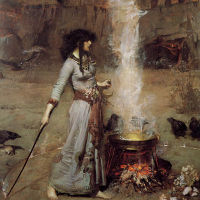As for the specifics of any particular Wiccan denomination, also called a tradition, I’m afraid it would be necessary to consult the sources directly but certain beliefs are held in common between them. What is commonly called the Wiccan rede, I will paraphrase. As it harms none, do what you will. Besides respect and reverence for nature and humanity together, they largely avoid moralistic dogmas, which is perhaps part of why outside faiths hold them in some suspicion.
And an equal role for the feminine. Ah. Indeed. Wiccan faiths are either dualistic and hold both genders as equally sacred, or favour the sacred feminine primarily, though none actually defame the masculine as a matter of doctrine.
Their holidays fall on the key points of the celestial year, the solstices, the equinoxes and the points between each, and they also hold observances on the full moon or as close to that as feasible for the individual coven. They do engage in prayer in a contemplative and communion sense, but they do not seek divine intervention as they utilize magickal practices to accomplish this instead. The gift of magick being seen as a divine gift intended for human use to address the issues that others might use intercessory prayer for.
Magick is often seen as being alive and workable because the creation process is still occurring and is constantly ongoing. So they just influence or “bend” what is already occurring. It’s more a form of assistance than actual dictation of nature’s behavior. In this it differs from say the Egyptian model of magick, wherein they believed the gods could be impelled to behave in specific ways by virtue of cosmic law that even they had to obey. In the Wiccan system, magick is more of a cooperation out of spiritual good will.
It’s very light based. I guess it got a reputation for dark because of other light based faiths being against it? Self-empowerment and trusting any measure of one’s own wisdom is considered borderline sinful, if not literally so.
In Wicca, you listen to the elders of the coven because their advice is useful and they are experienced. In Christianity, you listen to the priest because they are the authority on matters of church wisdom and doctrine, and they are representatives of a body that members seek to identify with and preserve above most other concerns, tribal versus institutional organization. Myself, I prefer the familial sensibility of the tribe.
That depends on the church, doesn’t it? Some churches are more centralized than others. Perhaps so. It’s hard to reference these issues without growing a touch controversial, which is not my intention. I do discuss topics requested. Though if left to my own devices I would avoid some for these reasons.
I hope that global institution and tribe are not our only two options. In fact they are not the only options though I will offer that even scientific research seems to point at the process that leads humans to organize into, at the minimum, extended family units, even if these units don’t actually relate to genetic descent.
I do hope this was at least some small help in understanding and perhaps dispelling some of the misunderstanding that crops up around faiths like these.
Your thoughts are welcome. Be well friends.
Travis Saunders
Dragon Intuitive
~science,mysticism,spirituality~

